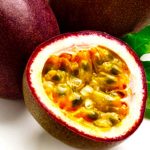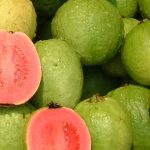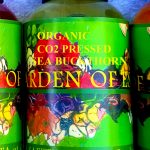Bulgarian Rose Oil calms and heals inflamed or broken skin structure, such as eczema, sunburn or broken veins.
 2) PASSION FLOWER OIL contains lycopene, which assists the skin in recovering from sun induced damage. Lycopene is a red colored carotenoid, and is a top anti-aging component.
2) PASSION FLOWER OIL contains lycopene, which assists the skin in recovering from sun induced damage. Lycopene is a red colored carotenoid, and is a top anti-aging component.It contains 72% linolenic acid, (Omega-3), which is good for inflammatory and extra-dry conditions of the skin, like redness, flakyness, and eczema.
 3) CHAMOMILE FLOWER ESSENTIAL OIL is extremely anti-inflammatory, due to blue Azulene, which calms: eczema, rashes, burns, dermatitis, and sunburn.
3) CHAMOMILE FLOWER ESSENTIAL OIL is extremely anti-inflammatory, due to blue Azulene, which calms: eczema, rashes, burns, dermatitis, and sunburn.
 4) HIBISCUS FLOWER OIL – The big breakthrough in Hibiscus Oil is helping men and women with baldness. This amazing oil helps rejuvenate the scalp, to stimulate hair growth. Scientific studies are currently being conducted, to find out exactly which compounds are responsible for this.
4) HIBISCUS FLOWER OIL – The big breakthrough in Hibiscus Oil is helping men and women with baldness. This amazing oil helps rejuvenate the scalp, to stimulate hair growth. Scientific studies are currently being conducted, to find out exactly which compounds are responsible for this.
 5) LAVENDER FLOWER ESSENTIAL OIL is cytophyllactic, which means that it increases cell renewal to levels found in youth, so use it for: scars, wrinkles, burns, and stretch marks.
5) LAVENDER FLOWER ESSENTIAL OIL is cytophyllactic, which means that it increases cell renewal to levels found in youth, so use it for: scars, wrinkles, burns, and stretch marks.
 6) CALENDULA FLOWER OIL, also known as Marigold Flower Oil, is suitable for sensitive skins and babies.
6) CALENDULA FLOWER OIL, also known as Marigold Flower Oil, is suitable for sensitive skins and babies.Its anti-inflammatory properties are due to its triterpenoids, which alleviate diaper rash, and infant’s scrapes, bruises and insect bites.
A staggering 19 carotenoids have been identified in Calendula’s petals, which act as antioxidants, effectively healing damaged skin.
People who suffer from dermatitis, psoriasis and eczema, can benefit from the topical application of Calendula Oil, as it can reduce the skin inflammation of such conditions.
You can use Calendula Oil for scars, or for preventing or reducing the formation of scar tissue, so its the perfect pregnancy oil. Calendula flower oil can increase the skin’s collagen levels, and this is the reason why it can prevent the formation of stretch mark or scar.
The Science Behind Facial Oil Claims
Of all the many Vitamins, only Vitamin A and Vitamin C can penetrate the skin’s upper layers, and reach the deeper cells which produce collagen, which is what keeps skin firm and youthful. (https://www.ncbi.nlm.nih.gov/pmc/articles/PMC3673383/).
 That is why I recommend using 100% natural, cold pressed plant oils, whose true Vitamin C content is freely available from many reputable websites. For example, Guava Seed Oil, Broccoli Seed Oil, and in particular, Goji Berry Seed Oil, which contains 500 times more Vitamin C than found in oranges.
That is why I recommend using 100% natural, cold pressed plant oils, whose true Vitamin C content is freely available from many reputable websites. For example, Guava Seed Oil, Broccoli Seed Oil, and in particular, Goji Berry Seed Oil, which contains 500 times more Vitamin C than found in oranges. Some Vitamin C serums claim to contain these natural plant oils, like Sea Buckthorn Oil, which contains a Vitamin C content 12 times higher than oranges, but that does not compare to Goji Berry Seed Oil, which contains 500 times more Vitamin C than found in oranges.
Some Vitamin C serums claim to contain these natural plant oils, like Sea Buckthorn Oil, which contains a Vitamin C content 12 times higher than oranges, but that does not compare to Goji Berry Seed Oil, which contains 500 times more Vitamin C than found in oranges. 